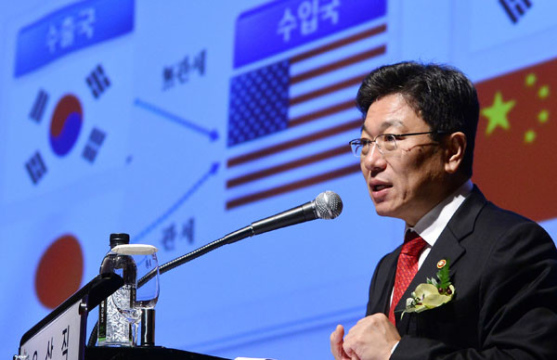
Mexican vs Chinese Factories
With the rising cost of wages in China, manufacturers are increasingly considering Mexico an attractive location to ‘re-shore’ production.
This post is also available in: Spanish
While the political left seems to be in retreat in most of Latin America, local elections in Mexico confirmed the momentum behind leftist Andrés Manuel López Obrador (or AMLO). His party, Morena (National Regeneration Movement) fell only three points short of defeating the mighty PRI (Institutional Revolutionary Party) in its historic stronghold of the state of Mexico. Traditional parties—the once-hegemonic PRI and its conservative rival PAN—have raised the alarm and warned about the “populist threat” López Obrador represents, comparing the leader of Morena with the late Venezuelan strongman Hugo Chávez. Although these allegations are mostly a campaign strategy, the tight race in the state of Mexico and AMLO’s steady lead in presidential polls could anticipate an unprecedented political change in Latin America’s second largest economy.
For some time now, domestic and external factors seem to be aligning in favor of López Obrador, who will run for president for the third consecutive time in July 2018. His rise is likely fueled by voters’ dissatisfaction with traditional parties, rather than the reflection of a major ideological shift. Twelve years of rule by the PAN (2000-2006 and 2006-2012) and more than four under the “new PRI” of incumbent president Enrique Peña Nieto have failed to resolve the structural problems facing Mexico, including extremely high levels of violence and corruption, deficient public services and immense economic inequality. A former member of the PRI himself, López Obrador has based his political appeal on his staunch opposition to the political status quo led by the PRI and the PAN, which he frequently calls “the regime” or “the power mafia.”
The mistakes of the traditional parties have only boosted AMLO’s strength. Peña Nieto was able to pass significant reforms at the beginning of his term, including the end of the state monopoly over the oil sector (a historic sacred cow of Mexican nationalism), an opening of the telecommunications sector dominated by businessman Carlos Slim, and a moderate relaxation of labor regulations. As important as these measures were, the government was ineffective in implementing them, and failed to communicate the benefits to the wider population. After leaving his former party (the PRD, a leftwing splinter of the PRI) in 2012 and denouncing its support of Peña’s agenda, López Obrador has successfully portrayed the reforms as the latest attempt by political and business elites to enrich themselves at the expense of Mexico’s sovereignty and welfare.
In no small measure, AMLO has risen in the polls because he is seen as the “anti-Peña.” Corruption scandals, economic slowdown and the rising violence of drug cartels have deeply affected the incumbent’s popularity, with more than a year and a half left in his term. Some polls show that less than 20% of Mexicans approve of Peña Nieto’s performance as president. The president is perceived as distant and elitist, a member of a political dynasty—known as “Grupo Atlatomulco”—which has ruled the state of Mexico for 23 years (29 if we add the term of newly elected governor Alfredo del Mazo, Peña’s first cousin). AMLO, on the other hand, is seen by many as an enemy of entrenched political and economic interests, an anti-corruption crusader with a modest lifestyle and a leader sensitive to the concerns of most vulnerable Mexicans.
On the international front, Donald Trump’s xenophobic and anti-Mexican discourse, including the infamous border wall, has accentuated the same Mexican nationalism López Obrador has worked to channel. While Peña Nieto and his powerful foreign minister Luis Videgaray have hedged their bets and maintained a mostly moderate tone with the American president, AMLO is free to denounce Trump’s racism in the harshest terms, a stance that (understandably) resonates with aggravated Mexicans. Polls indicate that Morena’s standing in the national polls (which were already on the rise) got a major boost after Trump’s victory in November 2016.
Prominent leaders of the PRI and the PAN have framed the 2018 elections as a choice between democracy and Venezuela-style authoritarianism. They suggest that López Obrador could be the Mexican version of Hugo Chávez or (even worse) his embattled successor Nicolás Maduro. The messianic tone of López Obrador’s public discourse is undeniable, and Morena (more a fan club of AMLO than a real political party) has failed to condemn human rights violations in Venezuela. But warnings about the imminent arrival of Chavismo with Mexican characteristics are by and large an exaggeration.
Although López Obrador is a defender of government intervention in the economy, he is hardly an enemy of the private sector. During his term as mayor of Mexico City (2000-2005) he governed pragmatically, expanding highways and working with businesses to revitalize neglected urban areas. AMLO’s economic platform is ambiguous, but he has frequently noted that he believes in the role of private businesses and in boosting competition, and he proposed a referendum on Peña Nieto’s energy reform instead of its immediate elimination should he come to power. Further, López Obrador is a savvy politician who knows that radicalization is a recipe for failure in a country historically adverse to political upheavals and abrupt changes. For example, Morena has challenged the PRI’s victory in the state of Mexico—citing voter intimidation tactics and other irregularities—but López Obrador has expressly refused to call for street protests of his followers, the strategy that he used after his narrow loss in the 2006 presidential elections.
López Obrador has shown restraint even regarding Mexico’s future relationship with the Trump administration. In an op-ed published in the Washington Post, the leader of Morena denounced Trump’s rhetoric but highlighted the need to continue cooperation between both countries. AMLO is skeptical of free trade just like President Trump. In fact, both nationalistic leaders believe NAFTA (the free trade agreement between the US, Mexico and Canada) has had negative consequences for their respective country’s workers. Having two volatile leaders in the US and Mexico would raise the uncertainty around an eventual renegotiation of NAFTA, but Trump tends to show more respect for fellow nationalists than for pro-globalization leaders.
Further, the PRI and the PAN are weakened, but by no means defeated. Peña Nieto’s low approval ratings and a lack of competitive candidates make it unlikely for the PRI to retain the presidency after 2018, but the party’s narrow victory in Mexico state shows that it still has the most formidable electoral machine in the country, which it has been building for over 90 years. PAN, on the other hand, has two strong contenders for the presidency (Puebla governor Rafael Moreno Valle and former first lady Margarita Zavala) and has reached an alliance with the PRD on the local level. There is no second round in Mexico, so a candidate can get elected with a relatively low percentage of the total vote. As in previous elections, the anti-López Obrador vote is likely to rally behind whoever is second in the polls, hoping to prevent AMLO from reaching the presidency.
Even if López Obrador reaches Los Pinos (the presidential palace), he will have to reach agreements with the political and economic elites he publicly denounces. AMLO’s popularity is stronger in Mexico City and other major urban centers, but tends to fade in rural areas, which will preserve the territorial and parliamentary dominance of the PRI and the PAN. No president has controlled a majority in Congress since the collapse of PRI’s hegemony in the late 20th century, and Morena does not have a single state governor, and very few city majors. In other words, López Obrador will need to talk to the “regime” to rule Mexico.
There is still plenty of time before Mexicans have to choose their next president, who will govern until 2024 (the last year of a hypothetical two-term Trump presidency). Electoral polls are extremely volatile, and AMLO is exceptionally prone to self-sabotage when victory is near. But the emergence of Morena and its impressive result in the heartland of the formerly almighty PRI place the Mexican left closer than ever to reaching the presidency. If López Obrador attracts political independents tired of corruption and violence and shows that he can reach agreements without compromising his principles, his third run might be the charm.
With the rising cost of wages in China, manufacturers are increasingly considering Mexico an attractive location to ‘re-shore’ production.
South Korea’s entry into the TPP will promote stronger cooperation between South Korea and Latin America.
Mexican civil society organizations and individuals are pressing for education reform, including reducing the Teachers’ Union.
